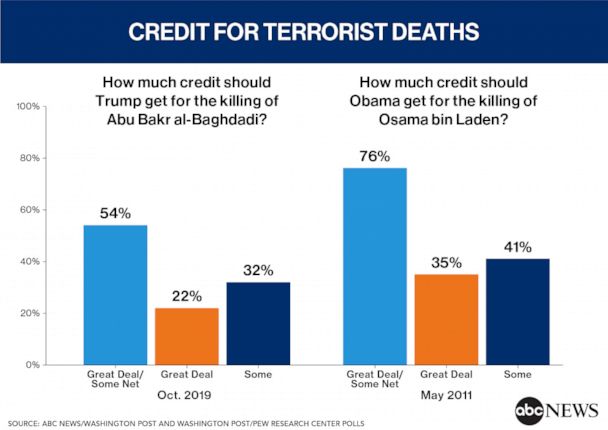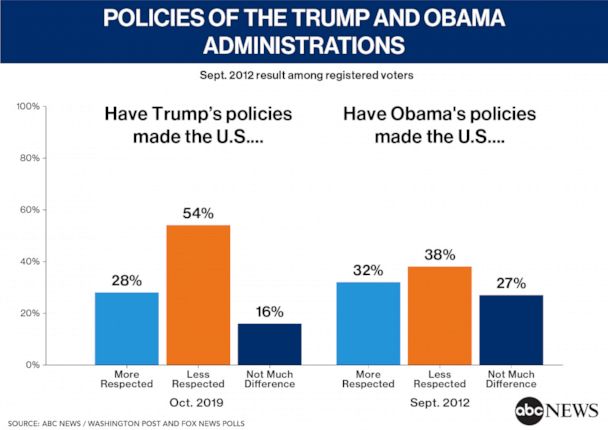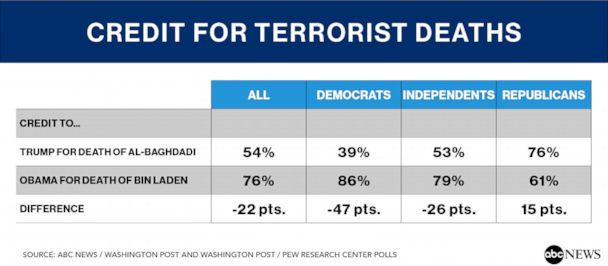54% credit Trump for ISIS leader's death but with broader doubts on Syria policy: POLL
A majority of Americans give Trump credit for the death of al-Baghdadi.
A majority of Americans in a new ABC News/Washington Post poll give Donald Trump credit for the death of ISIS leader Abu Bakr al-Baghdadi, but at a level that far lags credit for Barack Obama after the killing of Osama Bin Laden in May 2011.
Fifty-four percent say Trump deserves at least some credit for al-Baghdadi’s death in a raid by U.S. special forces Saturday in Syria – a great deal of credit, 22%, and “some” credit, 32%. That compares with 76% who credited Obama for the raid that killed bin Laden.

See PDF for full results, charts and tables.
Other results in this poll, produced for ABC by Langer Research Associates, point to limited if any positive impact for Trump. Forty-four percent see him as a strong leader, with no bump from its level in January (48%). Most, 54%, don’t see him that way.
Indeed, credit for Trump is countered by criticism on other, related fronts.The public by 44-12% thinks the withdrawal will weaken, not strengthen, U.S. efforts against ISIS. (The rest see no difference.)
More broadly, 54% think Trump’s policies have made the United States less respected around the world, more than said that about Obama, 38%, in a 2012 Fox News poll (conducted among registered voters).

Just a quarter (26%) think al-Baghdadi’s death will make the United States safer from terrorism, similar to views of security after bin Laden’s death. Fewer still, 16%, think it makes the country less safe, leaving a majority – 54% – who see no change. There was a higher sense of increased risk after bin Laden’s death; it subsided in a few months.
Partisans
Partisan patterns are markedly different than after the death of bin Laden. Then, in a Washington Post/Pew Research Center survey, majorities of Democrats, independents and Republicans alike said Obama deserved at least some credit – 86% of Democrats, 79% of independents and 61% of Republicans.
Trump, by contrast, gets credit from 76% of Republicans, dropping sharply to 53% among independents and 39% among Democrats.

Trump also underperforms in intensity of sentiment. In 2011, 52% of Democrats and 36% of independents gave Obama “a great deal” of credit for Bin Laden’s death. Today, Trump gets a great deal of credit from 41% of Republicans and 18% of independents.
Following now-typical patterns in views of Trump, he also gets more credit from men than from women, 61 vs. 47%, in line with differences in partisan affiliation. (There’s an especially sharp 20-point gap between suburban men and women.) He gets credit from 59% of whites vs. 44% of people of other racial or ethnic backgrounds; and from 59% in the states he won in 2016, vs. 47% elsewhere.
Partisanship informs other views, as well. Forty-five percent of Republicans think al-Baghdadi’s death makes the United States safer from terrorism; half as many independents (22%) and a third as many Democrats (15%) agree.
But the sharpest division, unsurprisingly, involves Trump himself. Eighty-four percent of Republicans see him as a strong leader. Again that’s sliced in half among independents, to 43%, and falls to just 15% among Democrats.
Methodology
This ABC News/Washington Post poll was conducted by landline and cellular telephone Oct. 27-30, 2019, in English and Spanish, among a random national sample of 1,003 adults. Results have a margin of sampling error of 3.7 points, including the design effect. Partisan divisions are 29-23-38 percent, Democrats-Republicans-independents.
The survey was produced for ABC News by Langer Research Associates of New York, N.Y., with sampling and data collection by Abt Associates of Rockville, Md. See details on the survey’s methodology here.